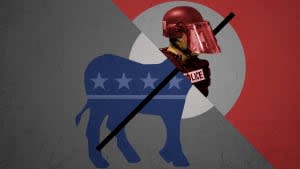What's really driving the Democratic shift on crime

There's been a definite change in the way the Democratic Party talks about crime. From President Biden to Florida Senate hopeful Val Demings to New York City mayoral primary vote-leader Eric Adams, prominent figures are taking pains to acknowledge that rising crime is a real problem, and that we're going to need well-funded police departments to address it.
As someone who argued for just such a turn, I'm gratified to see the shift. But I can already anticipate the next, dispiriting phase of the intra-Democratic crime debate, which had already begun as early as last November. Activists will decry the shift as hippie-punching aimed at mollifying an unappeasable hard right, while moderates will blame the activists for continuing to tar the party's image with unpopular radical stances.
It's an argument that both sides would do well to nip in the bud. In this case the messaging isn't just about politics — it's actually vital to the mission of restoring public safety.
On the surface, the activists might seem to have a point. The recent rise in violence is a national phenomenon, not particularly correlated to the victory of reform-minded prosecutors or mayors, and extending beyond the big cities to small towns and even rural areas. Moreover, most of the proposals that activists advocated, from ending cash bail to shifting funds from policing to other social services, have been implemented almost nowhere. How, then, could it be fair to blame criminal justice reform for the rise in crime? Meanwhile, left-wing critics are right that in a contest of rhetoric, Republicans should always be able to outbid tough-on-crime Democrats. Why play a game you can't win?
But the deeper implication of that analysis is that a rhetorical shift won't be sufficient to change the valence of the issue. To reap any sustained political benefit, the Democrats actually have to make headway in reducing crime — which means proposing and implementing solutions that work. That may include some of the things reformers have advocated, like shifting the burden of dealing with the homeless and mentally ill off of police and onto other social service agencies. But effective policing is an indispensable element in bringing crime down — and that will require fully-staffed departments with robust institutional support.
Consider some of the dynamics sustaining the alarming rise in shootings. As gun violence becomes more common, it becomes simply rational for individuals worried about the possibility of such violence to go armed, whether legally or, frequently, illegally. But the more armed individuals you have in a given situation, the more likely it is that an altercation escalates to a shooting. What may have started as a rivalry between two individuals or two gangs can thereby metastasize into a situation with many axes of possible violence. Interrupting that dynamic will require raising the risk of arrest from going armed, to say nothing of the risk of arrest from firing the weapon. And that means having police present on the street — to prevent crime before it happens.
Right now, the staffing to do that just may not be available. Police departments around the country are hemorrhaging people. Retirements are up, and so are resignations by younger officers. Anecdotal evidence and surveys alike suggest one important driver of the exodus is the sense that they are no longer supported in their job: that the public doesn't appreciate their work and that elected and appointed officials are not prepared to back them up.
From a reformist perspective, that's not entirely a bad thing. The reflexive deference given to police is one reason why bad cops are so hard to drum out, and any kind of culture change will inevitably upset people who are especially invested in keeping things as they were. Large-scale departures could be seen as an opportunity to build police departments back better.
But under the best of conditions, it would be difficult to staff up rapidly while also improving force quality. With the economy going gangbusters, recruitment for a uniquely stressful job where most benefits are very back-loaded is going to be much more difficult. Adding a hostile political environment may make it impossible. That, I think, is the really important context of the new messages coming from Democrats at all levels. The message is not aimed solely at the voters, but also at America's police departments, to communicate that they are viewed as part of the solution, and not solely the problem.
Most of America's cities are governed by Democrats, and it's at the municipal level that most policing happens. With the presidency and both houses of Congress in Democratic hands, there's the political wherewithal to direct federal resources to aid in rebuilding police departments as well as reform them. They can aid both efforts by creating a climate that valorizes effective policing as an essential part of government.
You may also like
7 scathingly funny cartoons about Democrats' Joe Manchin problem
Bernie Sanders wants to know if cannabis reporter is 'stoned' right now

 Yahoo Finance
Yahoo Finance 